- Home
- E. M. Forster
Works of E M Forster Page 59
Works of E M Forster Read online
Page 59
“I tore the thing up.”
“Didn’t she say how she was? How does she sound? Cheerful?”
“Oh, yes I suppose so — no — not very cheerful, I suppose.”
“Then, depend upon it, it IS the boiler. I know myself how water preys upon one’s mind. I would rather anything else — even a misfortune with the meat.”
Cecil laid his hand over his eyes.
“So would I,” asserted Freddy, backing his mother up — backing up the spirit of her remark rather than the substance.
“And I have been thinking,” she added rather nervously, “surely we could squeeze Charlotte in here next week, and give her a nice holiday while plumbers at Tunbridge Wells finish. I have not seen poor Charlotte for so long.”
It was more than her nerves could stand. And she could not protest violently after her mother’s goodness to her upstairs.
“Mother, no!” she pleaded. “It’s impossible. We can’t have Charlotte on the top of the other things; we’re squeezed to death as it is. Freddy’s got a friend coming Tuesday, there’s Cecil, and you’ve promised to take in Minnie Beebe because of the diphtheria scare. It simply can’t be done.”
“Nonsense! It can.”
“If Minnie sleeps in the bath. Not otherwise.”
“Minnie can sleep with you.”
“I won’t have her.”
“Then, if you’re so selfish, Mr. Floyd must share a room with Freddy.”
“Miss Bartlett, Miss Bartlett, Miss Bartlett,” moaned Cecil, again laying his hand over his eyes.
“It’s impossible,” repeated Lucy. “I don’t want to make difficulties, but it really isn’t fair on the maids to fill up the house so.”
Alas!
“The truth is, dear, you don’t like Charlotte.”
“No, I don’t. And no more does Cecil. She gets on our nerves. You haven’t seen her lately, and don’t realize how tiresome she can be, though so good. So please, mother, don’t worry us this last summer; but spoil us by not asking her to come.”
“Hear, hear!” said Cecil.
Mrs. Honeychurch, with more gravity than usual, and with more feeling than she usually permitted herself, replied: “This isn’t very kind of you two. You have each other and all these woods to walk in, so full of beautiful things; and poor Charlotte has only the water turned off and plumbers. You are young, dears, and however clever young people are, and however many books they read, they will never guess what it feels like to grow old.”
Cecil crumbled his bread.
“I must say Cousin Charlotte was very kind to me that year I called on my bike,” put in Freddy. “She thanked me for coming till I felt like such a fool, and fussed round no end to get an egg boiled for my tea just right.”
“I know, dear. She is kind to every one, and yet Lucy makes this difficulty when we try to give her some little return.”
But Lucy hardened her heart. It was no good being kind to Miss Bartlett. She had tried herself too often and too recently. One might lay up treasure in heaven by the attempt, but one enriched neither Miss Bartlett nor any one else upon earth. She was reduced to saying: “I can’t help it, mother. I don’t like Charlotte. I admit it’s horrid of me.”
“From your own account, you told her as much.”
“Well, she would leave Florence so stupidly. She flurried— “
The ghosts were returning; they filled Italy, they were even usurping the places she had known as a child. The Sacred Lake would never be the same again, and, on Sunday week, something would even happen to Windy Corner. How would she fight against ghosts? For a moment the visible world faded away, and memories and emotions alone seemed real.
“I suppose Miss Bartlett must come, since she boils eggs so well,” said Cecil, who was in rather a happier frame of mind, thanks to the admirable cooking.
“I didn’t mean the egg was WELL boiled,” corrected Freddy, “because in point of fact she forgot to take it off, and as a matter of fact I don’t care for eggs. I only meant how jolly kind she seemed.”
Cecil frowned again. Oh, these Honeychurches! Eggs, boilers, hydrangeas, maids — of such were their lives compact. “May me and Lucy get down from our chairs?” he asked, with scarcely veiled insolence. “We don’t want no dessert.”
Chapter XIV: How Lucy Faced the External Situation Bravely
Of course Miss Bartlett accepted. And, equally of course, she felt sure that she would prove a nuisance, and begged to be given an inferior spare room — something with no view, anything. Her love to Lucy. And, equally of course, George Emerson could come to tennis on the Sunday week.
Lucy faced the situation bravely, though, like most of us, she only faced the situation that encompassed her. She never gazed inwards. If at times strange images rose from the depths, she put them down to nerves. When Cecil brought the Emersons to Summer Street, it had upset her nerves. Charlotte would burnish up past foolishness, and this might upset her nerves. She was nervous at night. When she talked to George — they met again almost immediately at the Rectory — his voice moved her deeply, and she wished to remain near him. How dreadful if she really wished to remain near him! Of course, the wish was due to nerves, which love to play such perverse tricks upon us. Once she had suffered from “things that came out of nothing and meant she didn’t know what.” Now Cecil had explained psychology to her one wet afternoon, and all the troubles of youth in an unknown world could be dismissed.
It is obvious enough for the reader to conclude, “She loves young Emerson.” A reader in Lucy’s place would not find it obvious. Life is easy to chronicle, but bewildering to practice, and we welcome “nerves” or any other shibboleth that will cloak our personal desire. She loved Cecil; George made her nervous; will the reader explain to her that the phrases should have been reversed?
But the external situation — she will face that bravely.
The meeting at the Rectory had passed off well enough. Standing between Mr. Beebe and Cecil, she had made a few temperate allusions to Italy, and George had replied. She was anxious to show that she was not shy, and was glad that he did not seem shy either.
“A nice fellow,” said Mr. Beebe afterwards “He will work off his crudities in time. I rather mistrust young men who slip into life gracefully.”
Lucy said, “He seems in better spirits. He laughs more.”
“Yes,” replied the clergyman. “He is waking up.”
That was all. But, as the week wore on, more of her defences fell, and she entertained an image that had physical beauty. In spite of the clearest directions, Miss Bartlett contrived to bungle her arrival. She was due at the South-Eastern station at Dorking, whither Mrs. Honeychurch drove to meet her. She arrived at the London and Brighton station, and had to hire a cab up. No one was at home except Freddy and his friend, who had to stop their tennis and to entertain her for a solid hour. Cecil and Lucy turned up at four o’clock, and these, with little Minnie Beebe, made a somewhat lugubrious sextette upon the upper lawn for tea.
“I shall never forgive myself,” said Miss Bartlett, who kept on rising from her seat, and had to be begged by the united company to remain. “I have upset everything. Bursting in on young people! But I insist on paying for my cab up. Grant that, at any rate.”
“Our visitors never do such dreadful things,” said Lucy, while her brother, in whose memory the boiled egg had already grown unsubstantial, exclaimed in irritable tones: “Just what I’ve been trying to convince Cousin Charlotte of, Lucy, for the last half hour.”
“I do not feel myself an ordinary visitor,” said Miss Bartlett, and looked at her frayed glove.
“All right, if you’d really rather. Five shillings, and I gave a bob to the driver.”
Miss Bartlett looked in her purse. Only sovereigns and pennies. Could any one give her change? Freddy had half a quid and his friend had four half-crowns. Miss Bartlett accepted their moneys and then said: “But who am I to give the sovereign to?”
“Let’s leave it all till
mother comes back,” suggested Lucy.
“No, dear; your mother may take quite a long drive now that she is not hampered with me. We all have our little foibles, and mine is the prompt settling of accounts.”
Here Freddy’s friend, Mr. Floyd, made the one remark of his that need be quoted: he offered to toss Freddy for Miss Bartlett’s quid. A solution seemed in sight, and even Cecil, who had been ostentatiously drinking his tea at the view, felt the eternal attraction of Chance, and turned round.
But this did not do, either.
“Please — please — I know I am a sad spoilsport, but it would make me wretched. I should practically be robbing the one who lost.”
“Freddy owes me fifteen shillings,” interposed Cecil. “So it will work out right if you give the pound to me.”
“Fifteen shillings,” said Miss Bartlett dubiously. “How is that, Mr. Vyse?”
“Because, don’t you see, Freddy paid your cab. Give me the pound, and we shall avoid this deplorable gambling.”
Miss Bartlett, who was poor at figures, became bewildered and rendered up the sovereign, amidst the suppressed gurgles of the other youths. For a moment Cecil was happy. He was playing at nonsense among his peers. Then he glanced at Lucy, in whose face petty anxieties had marred the smiles. In January he would rescue his Leonardo from this stupefying twaddle.
“But I don’t see that!” exclaimed Minnie Beebe who had narrowly watched the iniquitous transaction. “I don’t see why Mr. Vyse is to have the quid.”
“Because of the fifteen shillings and the five,” they said solemnly. “Fifteen shillings and five shillings make one pound, you see.”
“But I don’t see— “
They tried to stifle her with cake.
“No, thank you. I’m done. I don’t see why — Freddy, don’t poke me. Miss Honeychurch, your brother’s hurting me. Ow! What about Mr. Floyd’s ten shillings? Ow! No, I don’t see and I never shall see why Miss What’s-her-name shouldn’t pay that bob for the driver.”’
“I had forgotten the driver,” said Miss Bartlett, reddening. “Thank you, dear, for reminding me. A shilling was it? Can any one give me change for half a crown?”
“I’ll get it,” said the young hostess, rising with decision.
“Cecil, give me that sovereign. No, give me up that sovereign. I’ll get Euphemia to change it, and we’ll start the whole thing again from the beginning.”
“Lucy — Lucy — what a nuisance I am!” protested Miss Bartlett, and followed her across the lawn. Lucy tripped ahead, simulating hilarity. When they were out of earshot Miss Bartlett stopped her wails and said quite briskly: “Have you told him about him yet?”
“No, I haven’t,” replied Lucy, and then could have bitten her tongue for understanding so quickly what her cousin meant. “Let me see — a sovereign’s worth of silver.”
She escaped into the kitchen. Miss Bartlett’s sudden transitions were too uncanny. It sometimes seemed as if she planned every word she spoke or caused to be spoken; as if all this worry about cabs and change had been a ruse to surprise the soul.
“No, I haven’t told Cecil or any one,” she remarked, when she returned. “I promised you I shouldn’t. Here is your money — all shillings, except two half-crowns. Would you count it? You can settle your debt nicely now.”
Miss Bartlett was in the drawing-room, gazing at the photograph of St. John ascending, which had been framed.
“How dreadful!” she murmured, “how more than dreadful, if Mr. Vyse should come to hear of it from some other source.”
“Oh, no, Charlotte,” said the girl, entering the battle. “George Emerson is all right, and what other source is there?”
Miss Bartlett considered. “For instance, the driver. I saw him looking through the bushes at you, remember he had a violet between his teeth.”
Lucy shuddered a little. “We shall get the silly affair on our nerves if we aren’t careful. How could a Florentine cab-driver ever get hold of Cecil?”
“We must think of every possibility.”
“Oh, it’s all right.”
“Or perhaps old Mr. Emerson knows. In fact, he is certain to know.”
“I don’t care if he does. I was grateful to you for your letter, but even if the news does get round, I think I can trust Cecil to laugh at it.”
“To contradict it?”
“No, to laugh at it.” But she knew in her heart that she could not trust him, for he desired her untouched.
“Very well, dear, you know best. Perhaps gentlemen are different to what they were when I was young. Ladies are certainly different.”
“Now, Charlotte!” She struck at her playfully. “You kind, anxious thing. What WOULD you have me do? First you say ‘Don’t tell’; and then you say, ‘Tell’. Which is it to be? Quick!”
Miss Bartlett sighed “I am no match for you in conversation, dearest. I blush when I think how I interfered at Florence, and you so well able to look after yourself, and so much cleverer in all ways than I am. You will never forgive me.”
“Shall we go out, then. They will smash all the china if we don’t.”
For the air rang with the shrieks of Minnie, who was being scalped with a teaspoon.
“Dear, one moment — we may not have this chance for a chat again. Have you seen the young one yet?”
“Yes, I have.”
“What happened?”
“We met at the Rectory.”
“What line is he taking up?”
“No line. He talked about Italy, like any other person. It is really all right. What advantage would he get from being a cad, to put it bluntly? I do wish I could make you see it my way. He really won’t be any nuisance, Charlotte.”
“Once a cad, always a cad. That is my poor opinion.”
Lucy paused. “Cecil said one day — and I thought it so profound — that there are two kinds of cads — the conscious and the subconscious.” She paused again, to be sure of doing justice to Cecil’s profundity. Through the window she saw Cecil himself, turning over the pages of a novel. It was a new one from Smith’s library. Her mother must have returned from the station.
“Once a cad, always a cad,” droned Miss Bartlett.
“What I mean by subconscious is that Emerson lost his head. I fell into all those violets, and he was silly and surprised. I don’t think we ought to blame him very much. It makes such a difference when you see a person with beautiful things behind him unexpectedly. It really does; it makes an enormous difference, and he lost his head: he doesn’t admire me, or any of that nonsense, one straw. Freddy rather likes him, and has asked him up here on Sunday, so you can judge for yourself. He has improved; he doesn’t always look as if he’s going to burst into tears. He is a clerk in the General Manager’s office at one of the big railways — not a porter! and runs down to his father for week-ends. Papa was to do with journalism, but is rheumatic and has retired. There! Now for the garden.” She took hold of her guest by the arm. “Suppose we don’t talk about this silly Italian business any more. We want you to have a nice restful visit at Windy Corner, with no worriting.”
Lucy thought this rather a good speech. The reader may have detected an unfortunate slip in it. Whether Miss Bartlett detected the slip one cannot say, for it is impossible to penetrate into the minds of elderly people. She might have spoken further, but they were interrupted by the entrance of her hostess. Explanations took place, and in the midst of them Lucy escaped, the images throbbing a little more vividly in her brain.
Chapter XV: The Disaster Within
The Sunday after Miss Bartlett’s arrival was a glorious day, like most of the days of that year. In the Weald, autumn approached, breaking up the green monotony of summer, touching the parks with the grey bloom of mist, the beech-trees with russet, the oak-trees with gold. Up on the heights, battalions of black pines witnessed the change, themselves unchangeable. Either country was spanned by a cloudless sky, and in either arose the tinkle of church bells.
The garden
of Windy Corners was deserted except for a red book, which lay sunning itself upon the gravel path. From the house came incoherent sounds, as of females preparing for worship. “The men say they won’t go”— “Well, I don’t blame them” — Minnie says, “need she go?”— “Tell her, no nonsense”— “Anne! Mary! Hook me behind!”— “Dearest Lucia, may I trespass upon you for a pin?” For Miss Bartlett had announced that she at all events was one for church.
The sun rose higher on its journey, guided, not by Phaethon, but by Apollo, competent, unswerving, divine. Its rays fell on the ladies whenever they advanced towards the bedroom windows; on Mr. Beebe down at Summer Street as he smiled over a letter from Miss Catharine Alan; on George Emerson cleaning his father’s boots; and lastly, to complete the catalogue of memorable things, on the red book mentioned previously. The ladies move, Mr. Beebe moves, George moves, and movement may engender shadow. But this book lies motionless, to be caressed all the morning by the sun and to raise its covers slightly, as though acknowledging the caress.
Presently Lucy steps out of the drawing-room window. Her new cerise dress has been a failure, and makes her look tawdry and wan. At her throat is a garnet brooch, on her finger a ring set with rubies — an engagement ring. Her eyes are bent to the Weald. She frowns a little — not in anger, but as a brave child frowns when he is trying not to cry. In all that expanse no human eye is looking at her, and she may frown unrebuked and measure the spaces that yet survive between Apollo and the western hills.
“Lucy! Lucy! What’s that book? Who’s been taking a book out of the shelf and leaving it about to spoil?”
“It’s only the library book that Cecil’s been reading.”
“But pick it up, and don’t stand idling there like a flamingo.”
Lucy picked up the book and glanced at the title listlessly, Under a Loggia. She no longer read novels herself, devoting all her spare time to solid literature in the hope of catching Cecil up. It was dreadful how little she knew, and even when she thought she knew a thing, like the Italian painters, she found she had forgotten it. Only this morning she had confused Francesco Francia with Piero della Francesca, and Cecil had said, “What! you aren’t forgetting your Italy already?” And this too had lent anxiety to her eyes when she saluted the dear view and the dear garden in the foreground, and above them, scarcely conceivable elsewhere, the dear sun.

 The Celestial Omnibus and Other Stories
The Celestial Omnibus and Other Stories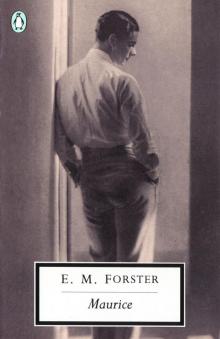 Maurice
Maurice The Longest Journey
The Longest Journey Howards End
Howards End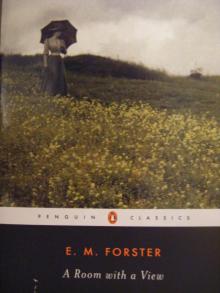 A Room with a View
A Room with a View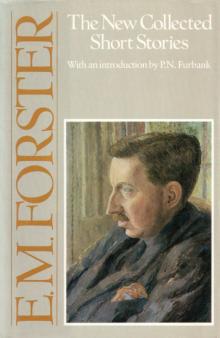 The New Collected Short Stories
The New Collected Short Stories A Passage to India
A Passage to India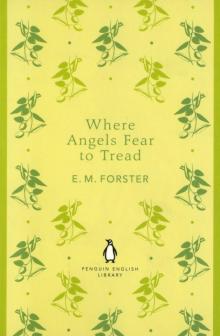 Where Angels Fear to Tread
Where Angels Fear to Tread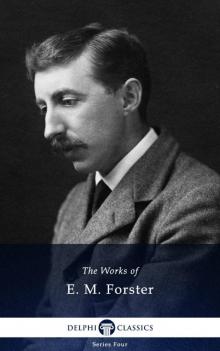 Works of E M Forster
Works of E M Forster Selected Stories
Selected Stories The Machine Stops
The Machine Stops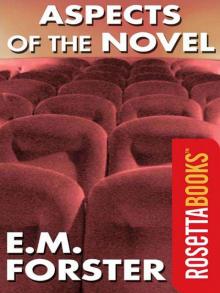 Aspects of the Novel
Aspects of the Novel